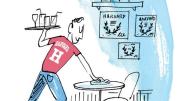There is a naïve belief [upon graduating] that you can do anything, that the world is your oyster,” says Yule Caise of Santa Monica, a writer-director and producer of films, new media, and television shows (perhaps best known for his work on NBC’s Heroes). “That is a great thing about going to Harvard. But it is also a double-edged sword. I think it got some people in trouble because sometimes you can’t do whatever it is without proper preparation. You may think you can, but it’s often necessary to train”—or to endure the humbling experience of starting from the bottom in a professional field. “My friends who did not go to Harvard did not have this false sense of security and were out there hustling from the get-go.”
The College could help current students more by infusing their educational experience with more practical realities, he says. Workshops on how to turn a calling to the arts into a career would have helped him a lot, for example. “It would also be useful for students to have a roundtable course, with discussions, about entering life post-college, a ‘finishing class,’ so to speak, that is for seniors only,” he adds. “It could be a half-course that is fun, deals with some practicalities I’m sure many students are lacking, and encourages students to think beyond ‘getting a job’ and lean toward personal satisfaction, which promotes happier and ultimately more successful people.”
Students should also “get jobs!” during the year, or at least the summers. “Learn how to do something. I don’t care if it’s bartending or cleaning,” he says. “There is a humility in learning the basics in life, and at some point you are going to have to do the small stuff. If you cannot bring yourself to do those things, it can be a roadblock you can’t get beyond.”
Caise is heartened to see that Harvard seems to take the arts more seriously than when he was a visual and environmental studies concentrator and had to fight to make a fiction film for his thesis. (In the end, he won a Hoopes Prize for exceptional work.) When trying to find alumni contacts in the arts and entertainment world, he was on his own. He thinks perhaps even more could be done to integrate arts into undergraduate education: “I feel strongly that students should be highly encouraged to participate in some sort of artistic endeavor, much as one should be encouraged to participate in the sciences. The perspective gained from the arts is one of the many things that give Harvard students a leg up over other ‘book-smart’ undergraduates. Being well-rounded is invaluable in the new world.”






